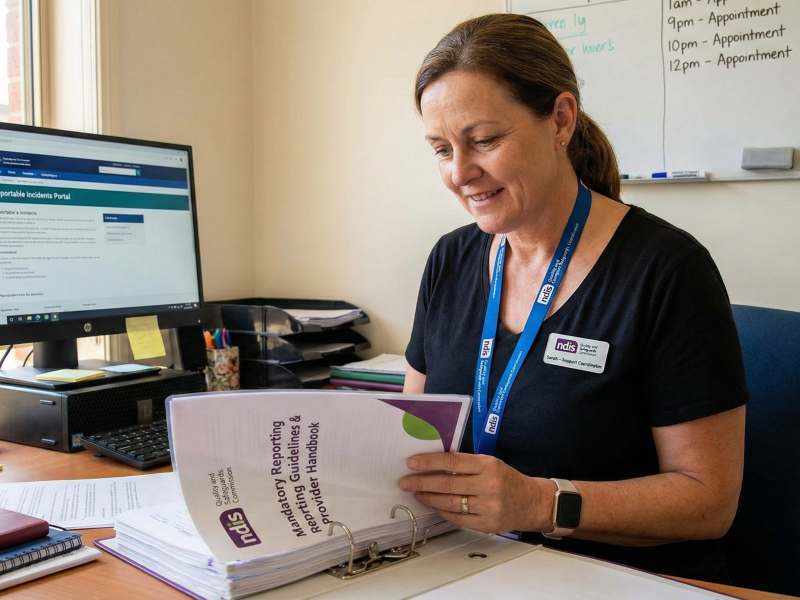The National Disability Insurance Scheme (NDIS) is an essential Australian Government program that funds the delivery of support and services for people with disability. Created to enhance the quality of life of people with permanent and significant disability, the NDIS substantially empowers Participants by covering the cost of many supports and services they require to support their disability and live more independently.
What is the NDIS?
The NDIS is the National Disability Insurance Scheme; a federal initiative that provides long-term, individualised support to individuals with disability, their families, and carers. The word “Insurance” emphasises the scheme’s focus on investing in people’s futures, enabling access to services that cater to each individual’s goals, lifestyle, and future aspirations, building a more inclusive society throughout the nation.
The National Disability Insurance Agency (NDIA) administers the scheme, working alongside the NDIS Commission (Commission) to ensure that NDIS Participants receive appropriate supports and services.
Want to Attract More NDIS Clients?
Get expert advice on how to market your services, connect with clients, and grow your practice.
How Does It Work?
The NDIS provides funding for supports and services delivered to NDIS Participants. It is not means-tested, and operates via an individualised funding approach, ensuring Participants are provided with control and choice in the support and services they receive.
After an individual is found to be eligible, they collaborate with an NDIA Planner or Partner to develop a Plan specifying their needs, objectives, and the supports required. The plans may be managed individually by Participants or managed with the help of plan managers or the NDIA.
Supports funded though NDIS Plans include therapeutic supports, assistive technologies and modified equipment, employment and education supports, transportation, and assistance with household tasks and personal daily living activities.
Advantages of NDIS
The NDIS provides various advantages to the wider community and individual Participants.
- The scheme enables individuals with disability to become more independent, enhance their quality of life, and engage more meaningfully in society.
- Families and carers are assisted and relieved of their workload.
- The tailored plans make sure that funds are properly allocated according to the individual’s needs and preferences.
Eventually, in the long term, the NDIS encourages social inclusion, minimises long-term healthcare expenses for individuals and the public health system, and enables the development of more robust communities.
What Support Does It Provide to People with Disability?
NDIS Support is intended to enhance independence, capacity building, and personal goal attainment, such as the acquisition of employment, pursuing education, or independent living.
The NDIS funds a wide array of supports such as personal daily care, transport, therapy, home modification, assistive technology, and employment-related supports. It also facilitates Participants’ access to community engagement activities and the acquisition of life skills.
Eligibility Requirements
Participant Applicants must meet a number of requirements to access the NDIS, including:
- Age: Be under 65 years of age when lodging the application.
- Residency: Be an Australian citizen, permanent resident, or hold a Protected Special Category Visa.
- Disability: Have a permanent and significant disability that considerably diminishes their capacity to participate in day-to-day activities.
- Some individuals may also come under the early intervention scheme if receiving proper early support will minimise the longer term impacts of their condition’s development, for example the provision of speech pathology services to a child.
Funding
NDIS Funding is specifically designed to support each individual Participant’s needs, goals and preferences relevant to their disability. The NDIA examines each Participant’s situation to determine the budget allocated to the Participant. This budget is not a set amount of money; if is allocated according to the individual’s needs, and can vary considerably between NDIS Participants.
What Disabilities Does the NDIS Cover?
The NDIS assists people with various types of disabilities with a range of support needs. These disabilities can be intellectual, physical, sensory, cognitive, and psychosocial. Some examples are as follows:
- Physical disabilities, such as cerebral palsy, multiple sclerosis, spinal cord injuries, and muscular dystrophy.
- Intellectual disabilities, such as Down syndrome and global developmental delay.
- Sensory disabilities, such as hearing loss, deafness, blindness, or low vision.
- Cognitive impairments are caused by acquired brain injury.
- Psychosocial disabilities are linked with chronic mental health conditions like schizophrenia, bipolar disorder, and severe depression.
It is worth noting that eligibility depends not only on a diagnosis- the most important consideration is the impact of the condition on the ability of the person to function in daily life. The NDIA applies precise criteria to evaluate how a person’s disability influences their mobility, communication, social interaction, learning, self-care, and self-management.
Referrals Start With Reputation – We’ll Help You Build Both
From networking tips to service refinement, we guide NDIS providers toward lasting impact.
What Are NDIS Covered Services?
The NDIS pays for a broad range of services that are deemed “reasonable and necessary” to support Participants in reaching their goals, via 3 support budgets.
- Core Supports: Support with daily living needs, personal care, and consumables.
- Capacity Building Supports: Supports that enable Participants to acquire skills to be more independent. This may involve therapy sessions, support at work, and training.
- Capital Supports: Single payments toward equipment, home modifications, and assistive technologies.
These budgets are adaptable and intended to change as an individual’s needs and goals shift.
Conclusion
The NDIS is a revolutionary program that places people with disabilities at the forefront of their support and care. Although the eligibility criteria is precise, the scheme’s influence is extensive, going towards the development of a more inclusive and empathetic Australia. By providing customised funding and encouraging choice and control, the NDIS enables Participants to live more independent and meaningful lives. From therapy and mobility aids to employment assistance and social programs for inclusion, the NDIS encompasses a wide range of supports, improving the wider Australian community.
Reach out to the friendly team at Avaana for more information and NDIS Provider support!
FAQs
1. Who is eligible for NDIS?
To qualify for the NDIS, you must be below 65 years, residing in Australia, and either an Australian citizen, a permanent resident, or a holder of a Protected Special Category Visa. You need to have a permanent and substantial disability affecting the ability to carry out daily activities. Some Participants may qualify for early intervention support funding.
2. What kind of disabilities is the NDIS for?
The NDIS has a broad range of disabilities it covers, such as intellectual, physical, sensory, cognitive, and psychosocial impairments. It is not just a list of medical conditions but rather how the disability impacts functioning day-to-day. Autism, cerebral palsy, hearing and vision impairment, schizophrenia, and acquired brain injury can all be covered.
3. How do I get NDIS?
You may apply for the NDIS directly via the NDIA website or by telephone at 1800 800 110. You will be asked to provide details about your disability, medical documentation, and how you are affected by your condition in your everyday life. After application, an NDIA officer will evaluate your application, and if successful, assist in creating your first plan.
4. What kind of services does the NDIS offer?
The NDIS provides various services like daily personal care, transport, therapy, education and employment support, assistive technology, home modifications, and community participation programs. These services are selected according to your individual goals and individual needs. Every Participant has a personal plan that states the kind of assistance they will get.
5. Am I eligible to apply for NDIS funding for a condition that is not a listed disability?
Yes, you can still apply. The NDIS will not only use listed conditions but rather the way your condition impacts your functional ability. If your condition severely and permanently impacts your daily life, you can still qualify. You’ll need to show medical evidence that evidences how the condition restricts your abilities in major areas of your life.


